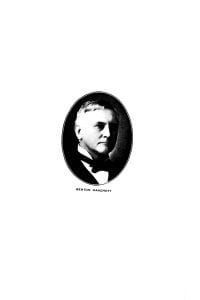Benton Hanchett, a respected lawyer from New York, moved to Michigan in 1858, becoming a key legal figure there. His educational journey led from local schools to the State and National Law School. His legal career included various partnerships, extending his practice to the highest US courts. Politically, he served as Shiawassee County’s prosecuting attorney, Saginaw City’s mayor, and on the Union School District board, but declined a Supreme Court of Michigan appointment. Near the end of President Harrison’s term, he was nearly appointed Circuit Court of Appeals Justice. Hanchett was twice married, fathering two children. Beyond law, he held prominent roles in several businesses and banks.

Benton Hanchett was born on April 6, 1835, in the town of Marshall, Oneida County, New York. His parents were Silas H. Hanchett and Eliza Dyer Hanchett. When he was five years old, his parents moved to the town of Palermo, Oswego County, New York, where he lived on their farm until he was eighteen years old. He received his education in the district schools, at Falley Seminary in Fulton, New York, and at Cazenovia Seminary in Cazenovia, New York. In 1858, he graduated from the State and National Law School in Poughkeepsie, New York. In the fall of that year, he came to Michigan and joined the law office of A. & E. Gould in Owosso. In January 1859, he was admitted to the bar in the Circuit Court at Saginaw. On July 1, 1861, he became a member of the firm of Goulds & Hanchett in Owosso. In 1863, he formed a partnership with Gilbert R. Lyon, also in Owosso. In November 1865, he moved to Saginaw and became a partner with Augustine S. Gaylord in the firm of Gaylord & Hanchett. This partnership continued until Mr. Gaylord’s death in June 1877. In 1881, Mr. Gilbert M. Stark and Mr. Hanchett became partners under the firm name of Hanchett & Stark. In 1887, Mr. Hanchett’s son, Leslie Benton Hanchett, joined the partnership, and the firm became Hanchett, Stark & Hanchett. On January 1, 1894, Mr. Stark retired from the firm, which was then renamed Hanchett & Hanchett. Leslie Benton Hanchett died in June 1902.
Benton Hanchett’s law practice extended widely across State Courts and United States Courts, including the District and Circuit Courts, the Circuit Court of Appeals, and the Supreme Court of the United States.
In 1862, he was elected prosecuting attorney of Shiawassee County. In 1872 and 1873, he served as mayor of Saginaw City. He was a member of the Board of Trustees of the Union School District of Saginaw City from 1867 to 1876. Although appointed by Governor Cyrus G. Luce, Mr. Hanchett did not accept the appointment as Justice of the Supreme Court of Michigan.
In February 1893, during the closing days of President Harrison’s administration, Mr. Hanchett was appointed by the president as Justice of the Circuit Court of Appeals of the United States for the Sixth District. Although the Judiciary Committee of the Senate recommended confirmation, Congress adjourned without taking action on the appointment.
In 1896, the University of Michigan awarded Mr. Hanchett the degree of Doctor of Laws.
On November 18, 1861, Mr. Hanchett married Miss Ann Broadwell of Oswego Falls (now Fulton), New York. They had a son, Leslie Benton Hanchett, born in 1863. Mrs. Hanchett passed away on June 11, 1879. In 1881, Mr. Hanchett married Mrs. Susan E. Kimberly. They had a daughter, Mrs. Elise Benton Grant, of Cleveland, Ohio.
In addition to his legal practice, Mr. Hanchett engaged in various business ventures. He was a Director of the Bradley-Ramsay Lumber Company, The Saginaw Plate Glass Company, The Michigan Sugar Company, the Bank of Saginaw, the Detroit Trust Company, and the Frankenmuth State Bank. Since its organization, he has served as President of the Frankenmuth State Bank, and since 1904, he has been President of the Bank of Saginaw.

Benton Hanchett was my grandfather’s grandfather and we were all told he could read the Bible in English, Greek and Aramaic but did not go to church. He would read the Bible in the window of his house and when questioned he said he wasn’t one of these people who goes to church on Sunday to show how Christian he was. Instead, he was known to try and help almost all who came to him and asked for help. My grandfather adored him.
Would love to correspond with you. We have the same great grandfather 👴